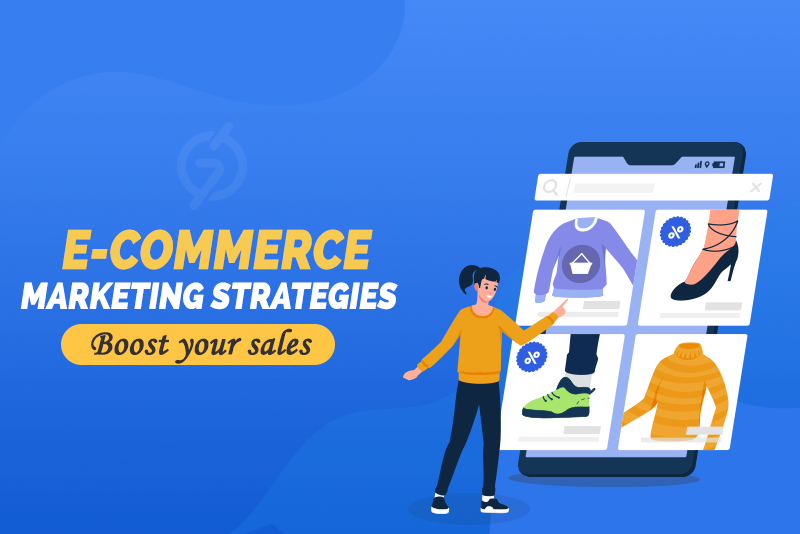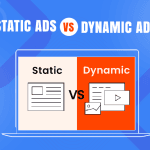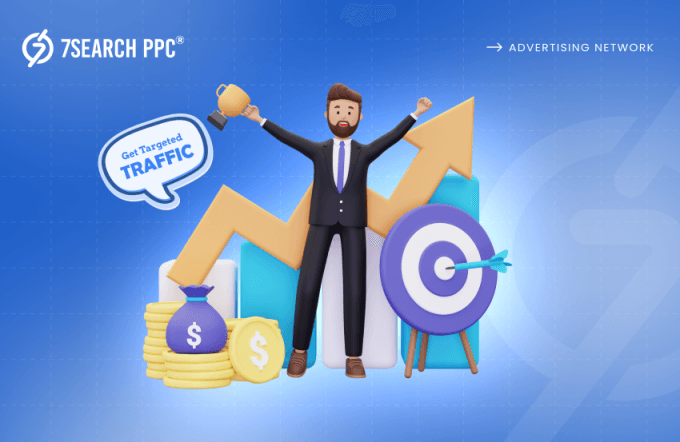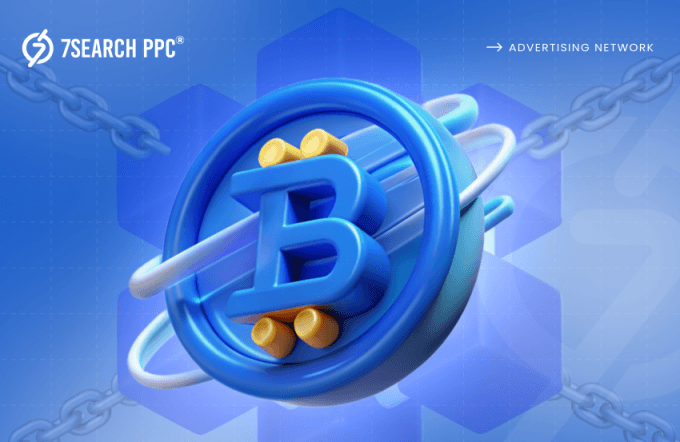You have set up your online store, added great products, and are now hoping for a rush of customers. But instead, you are not seeing much traffic or sales. You are starting to wonder, “What am I doing wrong?”
Don’t worry; this is a common challenge for new e-commerce businesses, and some old ones are also struggling to find their footing in the competitive online marketplace. The good news is there are proven e-commerce marketing strategies to overcome this and boost your sales.
Big e-commerce companies like Amazon and eBay are also gaining profits with each passing quarter by utilizing targeted digital marketing strategies. Amazon’s revenue for the quarter ending March 31, 2024, was $143.313 billion, representing a 12.53% increase year-over-year.
Their revenue for the twelve months ending March 31, 2024, totaled $590.740 billion, also showing a 12.54% increase year-over-year. eBay’s revenue for the twelve months ending March 31, 2024, was $10.158 billion, indicating a 3.42% increase year-over-year.
These two e-commerce companies are earning good revenue because they have succeeded in attracting traffic. So, why don’t we focus on that?
In this blog, we will share effective marketing tactics to enhance traffic to your e-commerce store and convert visitors into loyal customers.
What is E-commerce Marketing?
Suppose you own an online store where you sell various items such as books, toys, clothes, and much more. You utilize various approaches for the promotion of your online store, like email campaigns, PPC advertising, and SEO. The motive behind these approaches is to drive website traffic and sales for your online store.
Congrats! You understand the meaning of e-commerce marketing. This approach is also used to retarget customers who previously bought products or services from your e-commerce store or visited your site without making a purchase. However, some marketers use multichannel marketing strategies to promote their offerings, and some trust single-channel marketing strategies.
Are you feeling confused about which one is better for you? Although it’s your own choice, we can guide you in picking the best for your e-commerce store.
Which is More Effective: Multi or Single E-commerce Marketing Channel Strategy?
A multi-channel promotional strategy is typically better. Studies indicate that 95% of marketers agree that it’s crucial for effective promotion. Businesses can see revenue boosts of 38%, 120%, and 190% with each extra channel used. This method helps e-commerce stores reach more people, interact with customers, and sell more products, making it the best option for growth and maximizing earnings.
So overall, the conclusion is that sticking to a single e-commerce marketing channel for the promotion of your online store can limit your reach and potential for sales growth significantly.
Advantages of E-commerce Marketing
It provides numerous advantages that can strengthen a business’s online presence and boost sales. It puts the online store in a position where it can quickly reach and engage with a vast audience of potential customers worldwide. Here are some key benefits:
Targeted Advertising
Unlike traditional marketing, which follows demographic targeting limitations, e-commerce marketing digitally lets advertisers aim directly at specific groups. They can target people based on their age, interests, and online habits to find those most likely to want their products. This makes campaigns more effective and gets the most out of ad money spent.
Data-Driven Optimization
Are your e-commerce marketing efforts on the right track? How do you gauge the performance of your e-commerce advertising efforts? With traditional marketing, you can’t get accurate data on time, but digital marketing provides real-time analytics for immediate performance evaluation and adjustment. E-commerce marketing through digital channels helps advertisers get important data and stats.
They can see things like how many people see their ads, click on them, buy something, and even how customers move through the buying process. This info helps in making their digital advertising campaigns better. By studying what works and what doesn’t, advertisers can easily make changes that improve their marketing effectiveness and drive more sales.
Global Reach
E-commerce marketing generates an opportunity for advertisers to showcase their offerings in front of an audience regardless of geographical boundaries. Take Amazon, for example. Its headquarters are situated in Seattle, WA. Now, almost everyone in the world is aware of its name: that’s the benefit of marketing an e-commerce store.
Advertisers can reach a global audience with their e-commerce campaigns, which opens the doors to new markets and customer segments. This expands brand awareness and sales potential far beyond the reach of a physical store.
Cost-Effectiveness
Are you getting frustrated with paying a fixed cost for a particular e-commerce campaign? Yes, it can be frustrating because you can’t control the budget even if you are not satisfied with the results of your ongoing campaign. E-commerce marketing is often cheaper than traditional advertising.
Some digital marketing platforms offer flexible budgets with full control, and advertisers pay only when users interact with their ads, like clicking on them or per thousand impressions. This can help you spend your marketing money wisely and get the most out of it.
Flexibility and Scalability
E-commerce marketing is very flexible, allowing advertisers to experiment with different ad styles, budgets, and landing pages to see what works best. With this type of flexibility, advertisers can optimize their ad campaigns for the best results without compromising on average outcomes. Advertisers can easily scale up their campaigns based on the growing demand and reach of their products or services.
Develop Your E-commerce Marketing Strategy in 5 Steps
Developing an electronic commerce marketing plan involves several key steps to ensure it’s comprehensive and effective. Here is a structured approach to help you create an effective marketing plan for your e-commerce business:
Define Your Business Goals and Audience
Start by clearly outlining your company’s purpose and what sets you apart in the market. Define what you offer (and what you don’t) to clarify your unique selling proposition. Identify your target audience—where they live, their demographics (age, income), and their shopping behaviors. This understanding will guide all further marketing efforts.
Set Specific and Measurable Objectives
Instead of having a general goal of increasing sales, it’s more effective to set specific revenue targets and timelines. For example, aim to achieve $150,000 in revenue in the next quarter. Break this down into actionable metrics such as the amount of traffic needed, conversion rates required, and average order values to achieve these revenue goals.
Choose Your Marketing Channels and Tactics
The next step is to consider your audience and objectives when selecting the most effective e-commerce marketing channels. Take into account where your target customers are most active online, such as on social media platforms like Instagram, Telegram, and other leading platforms. Identify the specific strategies within each channel that match your resources and capabilities, such as:
- Creating Content
- Using Online Paid Advertising
- Collaborating with Influencers
- Implementing SEO Tactics
Develop a Content and Promotion Plan
Develop a balanced plan for creating and promoting content that perfectly connects with your audience and helps you achieve your goals. If you have limited resources, focus on strategies such as user-generated content and collaborations that attract the eyes of new audiences.
Identify key messages and themes that are consistent with your e-commerce brand and address the interests and challenges of your target audience.
Monitor, Measure, and Adapt
Ensure that you implement analytics tools to track the performance of your e-commerce marketing efforts against the defined KPIs (Key Performance Indicators). You must review these metrics to assess what’s working and what’s not, allowing you to update your strategy accordingly. You must optimize your campaigns on a regular basis to improve ROI and maximize your marketing budget.
Top Strategies for E-Commerce Marketing Success
To succeed in the e-commerce industry, you need to combine classic marketing techniques with new digital methods. Here are some key strategies to help you achieve this:
Pay-Per-Click Advertising
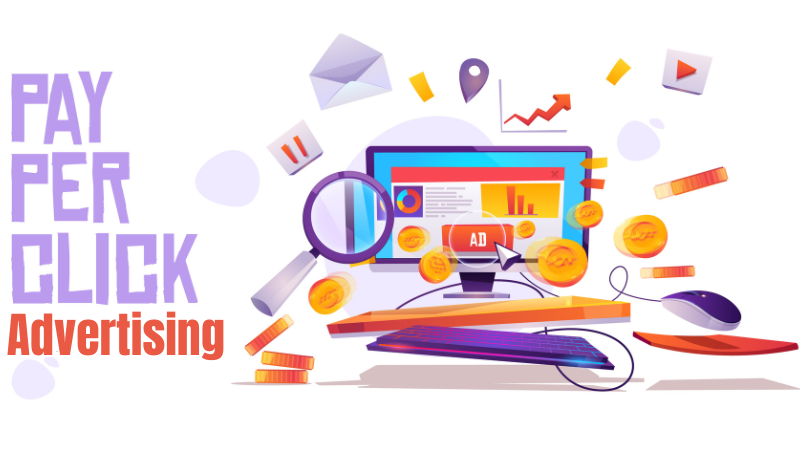
PPC advertising is a powerful e-commerce marketing strategy that ensures your products are prominently displayed at the forefront of search engine results pages (SERPs). By paying for this prime placement, brands can significantly enhance their visibility and attract their ideal customers. Effective PPC campaigns consist of:
- A compelling ad
- An engaging offer
- A well-designed landing page.
These campaigns complement not only SEO efforts but also maximize marketing budgets. PPC ads can be deployed on search engines, websites, and relevant blogs, enabling brands to follow users across different sites and boost product visibility.
Search Engine Optimization (SEO)
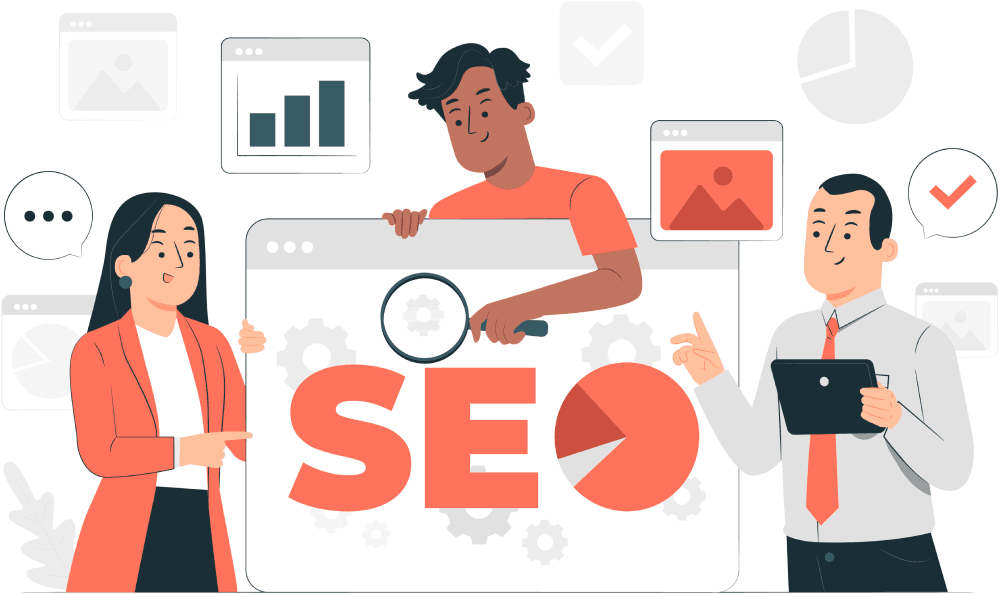
In order to succeed in e-commerce marketing, it is crucial to optimize for search engines (SEO). This means regularly updating websites with high-quality, relevant content that brings value to customers. Effective SEO ensures that your content appears on SERPs for relevant queries, which helps enhance the customer experience (CX) by making it easier for them to find what they are looking for.
If you have a marketing team, you then ask them to integrate keywords naturally into their content and use easy-to-read URLs and descriptive page names with primary keywords.
By conducting relevant and high-performing keyword research, you can uncover opportunities to create new, targeted content that attracts and engages customers. SEO can help you with the following:
- Increases Organic Traffic
- Builds Brand Credibility and Trust
- Improves Conversion Rates
- Enhances Local Search Presence
Content Marketing
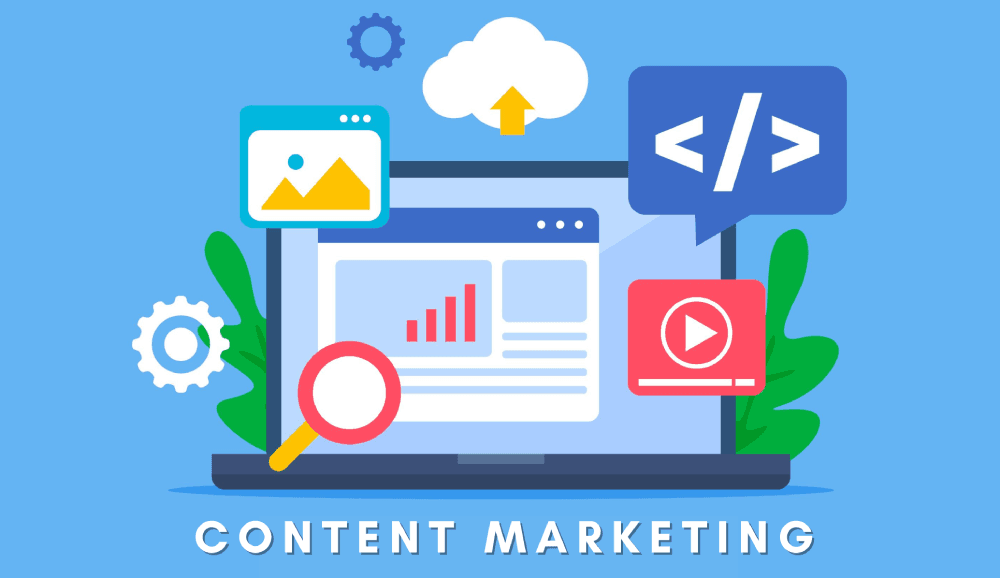
Content marketing is key to e-commerce success. It raises brand awareness, educates customers, and attracts visitors. By sharing quality content like:
-
- Blog Posts,
- Videos (including expertly crafted video editing),
- Social Media Updates,
- Infographics,
businesses can connect with their ideal audience and build trust. This approach also boosts SEO, helping customers find products more easily. Additionally, content marketing strengthens customer relationships with:
- Useful information
- Promoting repeated purchases and loyalty
Consistently providing engaging content keeps your brand in people’s minds and establishes your business as a trusted industry leader.
Social Media Marketing

Achieving success in e-commerce marketing requires a focus on social media marketing. In addition to effective SEO practices for visibility, engaging with consumers on social media platforms allows brands to build genuine connections. These channels allow direct interaction so that marketing teams respond to the following:
- Customer Feedback and Reviews
- Insights and Market Research
It’s crucial to adapt content for each platform’s audience, like:
- Twitter prefers short updates
- Instagram users like visual stories
By choosing the right platforms and managing them well, brands can boost their online presence and attract more customers through targeted social media efforts.
Email Marketing
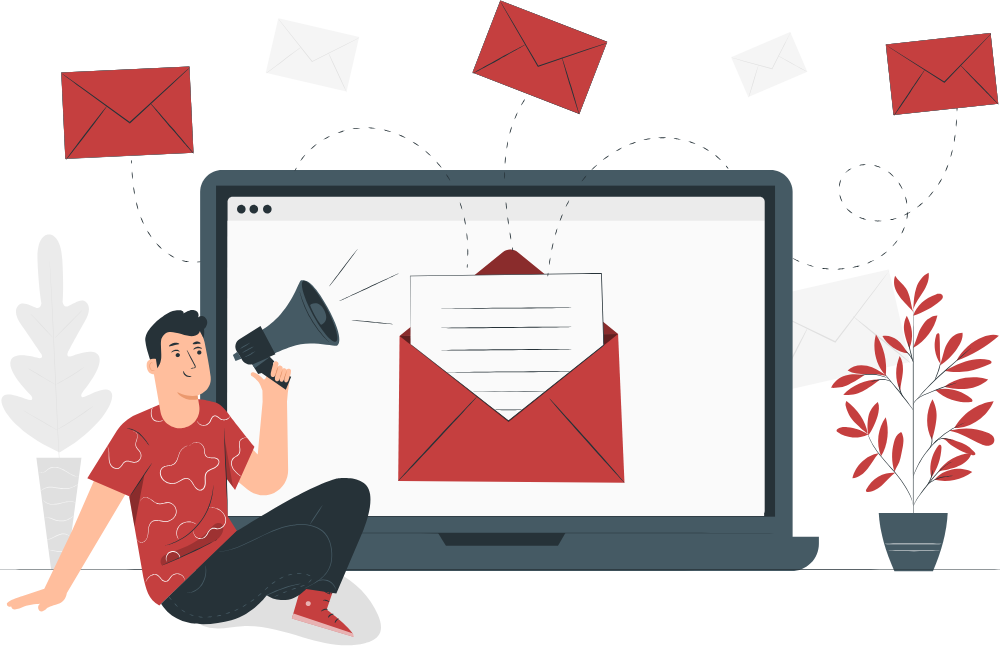
An underrated strategy for attaining success in e-commerce is to utilize email marketing effectively. Sending out emails allows businesses to tell customers about new products, deals, and useful information.
When these messages are personalized based on what customers like and buy, they are more likely to engage and stay loyal. This not only keeps customers in the loop but also helps build a strong relationship that encourages them to come again and again.
So, using personalized and timely emails in your e-commerce marketing plan can really boost sales and make your e-commerce business thrive.
Conclusion
Don’t get discouraged by low traffic or sales in your e-commerce store. You can engage new customers and turn them into loyal customers by implementing a comprehensive e-commerce marketing strategy.
You can use various approaches, such as PPC advertising, SEO, and more, to reach your target audience. By tracking and measuring your efforts, you can continually optimize your campaigns to enhance your ROI. Remember, success in e-commerce takes time and effort, but with the right strategies in place, you can watch your online store flourish.
Frequently Asked Questions (FAQs)
What is e-commerce marketing?
Ans. It is an approach for promoting online stores to attract more visitors and turn them into paying customers. It is like using a mic in the digital world to tell people about your awesome product.
Why is e-commerce marketing important?
Ans. There are tons of online stores these days, so you need a way to stand out. Marketing helps you reach more people, build trust with them, and convince them to buy from you instead of someone else.
Should I use one marketing channel or multiple for my e-commerce store?
Ans. Using multiple channels is often more effective. It’s like casting a net to catch fish; the more nets you use, the more fish you will catch. You can consider using PPC advertising, social media, email marketing, and other methods to reach as many people as possible.
What if I have a limited marketing budget?
Ans. There are many free and low-cost marketing options! You can start your e-commerce marketing journey with PPC advertising, which is cost-effective compared to other online paid advertising alternatives.
How often should I update my e-commerce marketing strategy?
Ans. The marketing world is constantly changing, so it’s a good idea to review your strategy regularly and adjust it as needed.

